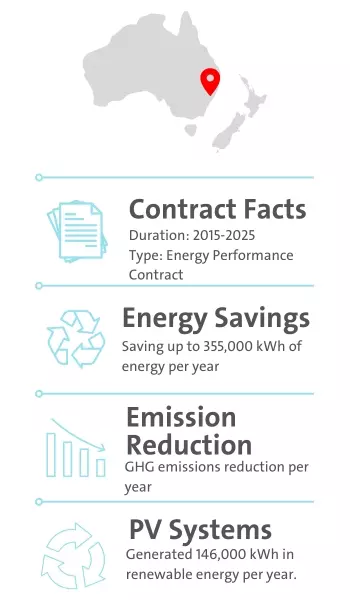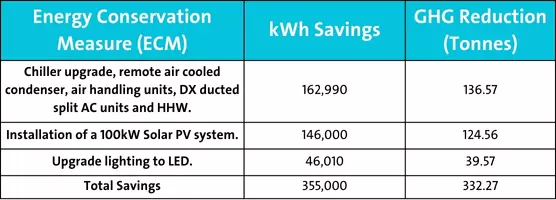DIVERSIFYING CARBON EFFICIENCY
Creating a tailored, diversified solution to help a community lifestyle complex reach its decarbonisation goals.
| The Challenge
The Muswellbrook District Workers Club (MDWC) is a major community recreation centre in the Hunter Valley in country New South Wales. The club promotes the wellbeing of community members through its support of local charities, sporting, and community groups, hosting social events, and offering meeting and function room hire. Looking to improve its carbon footprint, the MDWC was seeking a solution that advanced its energy efficiency capabilities, while maintaining a high standard of comfort for its various members and guests.
| Veolia’s Solution
In 2015, MDWC awarded Veolia an Energy Performance Contract (EPC) that consisted of a comprehensive energy upgrade to MDWC’s facilities with the aim of enhancing comfort for patrons while reducing the club’s environmental impacts.
Veolia designed and implemented a tailored, practical project plan that proposed facility and technology improvements which would decrease MDWC’s direct emissions, carbon footprint, and operational costs. By combining a diverse range of energy conservation and renewable solutions, Veolia was able to guarantee an energy saving of at least 209,000 kWh per year, with a potential annual reduction up to 355,000 kWh, resulting in thousands saved in energy bills.
Veolia’s EPC solution included the following energy conservation measures:
- Installation of a 100kW Solar PV system to reduce reliance on fossil fuel-sourced electricity.
- A full lighting upgrade through the installation of efficient LED lamps and fittings.
- Upgrading the existing DX HVAC system with a new high-efficiency chiller.
- Replacement of existing air handling units, further increasing HVAC system efficiency.
- Replacement of existing ducted split DX systems to CHW Fan Coil Units further increasing HVAC system efficiency.
- Implementation of economy mode and CO2 control to the new Air Handling and Fan Coil Units.
- Replacement of the existing Diesel Fired Heating Hot Water Boiler with a more efficient LPG Condensing Boiler.
- R134a refrigerant gas introduced to provide chilled water without drawing from electricity sources.
- Installation of a Building Management Control System (BMCS) to further improve environmental conditions and reduce energy consumption.
Veolia developed a comprehensive, turnkey approach that included the design, build, asset management, and performance guarantees on energy reduction initiatives. This diversified approach maximises MDWC’s return on investment, ensures patron satisfaction, and minimises owner risk by guaranteeing energy reduction results.

Like this solution?
Start implementing proven tactics today!
Explore our range of services to discover how you can achieve your operational and sustainability goals.
| The Benefits
Greater energy independence
Introducing a solar photovoltaic (PV) system to the site reduces MDWC’s reliance on fossil fuels to power its facilities, generating approximately 146,000 kWh in renewable energy per year.
Reduced carbon footprint and greenhouse gas (GHG) emissions
Using Veolia’s solutions, 332.27 tonnes in GHG emissions were avoided per year, which was largely achieved by reducing annual diesel consumption by 4,666L and carbon dioxide (CO2) emissions by 249 tonnes.
Guaranteed results
Veolia’s diversified approach ensured that MDWC’s energy use would decrease by at least 209,000 kWh per year, with a potential total saving of 355,000 kWh weather permitting.

HOW CAN WE HELP?
Our team of industry experts are here to support you and your business. We work alongside you to propel your sustainability efforts forward and achieve a common goal of Ecological Transformation.


